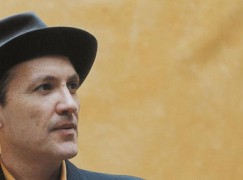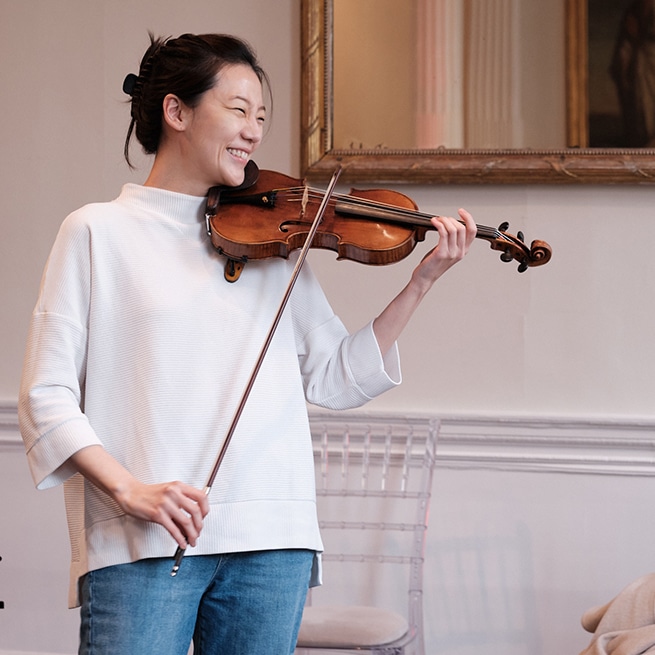Dead opera: The Met calls off Golijov commission
mainThe Argentine-US composer Osvaldo Golijov, 55, who has missed several deadlines in recent years, will not submit a long-planned opera to the Met.
Golijov’s publisher ascribes the cancellation to a difference of artistic opinion. The Met, feeding the story to the New York Times, appears to have pulled the plug. No-one’s saying much.






Maybe Mr Golijov has run-out of ideas? That happens often with composers who take-on more commissions than they can handle. The art of saying ‘no’ protects the source of inspiration, as does the ‘no’ of rejection.
Why does ‘everybody’ want to have a piece by Golijov? Because his mix of melodious, modal writing and process-music elements, with some folkore thrown-in, is effective because underneath the dynamics are entirely traditional. In other words, players, singers and audiences do recognize it as music, which is a very rare phenomenon, and in spite of the inconspicuous touch of film music now & then.
But real musical ideas unfold best in silence, far away from the rumor of ‘music business’.
Running out of ideas is more your specialty, true? And nasty attacks on the very recently deceased…..
He’s our Beckmesser.
I thought that Golijov was still very much alive. And if you had read carefully, you would have noticed I am in full sympathy of his music. It is the roots in tonality and tradition which gives his music colour and expression. If there were more Golijovs, all these commissions would not be heaped on one person. He does a couple of things that so many other composers don’t dare, or are incapable of.
Agree.
We enjoy listening to Golijov because it sounds like music.
Boulez, in comparison, always sounded like noise pollution to me.
Pity it’s not very good music – and sometimes it’s not even his own to begin with, as with the case of “Sidereus”, which was filched wholesale from a work by Ward Bergeman titled “Barbeich”
G’s music in general may not all be the very top, but to expect contemporary composers to achieve an artistic level comparable with the best of the repertoire is quite unfair. That someone is capable at all to write real music, in these times, is already praiseworthy. That some of it happens to be concocted from other sources without much working-through, is merely a sad sign of either running-out of ideas or taking on too many commissions, with the resulting deadline problems.
G’s music is not my taste at all, but I would always praise it, because of the musical talent. Some of it may be superficial and merely clever, but it’s superficial, clever music and not superficial clever nonsense as we hear so often (like Andrew Norman’s “Play” which earned him a fortune that he will spend on commissions for female USA collegues). I wonder why G is so popular with orchestras and opera companies, which seem to be totally ignorant of Nicolas Bacri, Guillaume Connesson, Karol Beffa, David Matthews, to name just a few who are as good or better than Golijiv, and as accessible and musically expressive.
Haven’t I heard about him on this blog missing other deadlines?
Composersblock, out of ideas, suffering from (kind of) climactericy et cetera?
Dig in your personal musicarchive, rework some academic compositions – a.o. ‘schoolfugues’- from these early days, insert or add this ‘new’ material in already written stuff and your inner-creative engine is working again, hopefully!
🙂
Maybe, but the opposite may work as well: Arvo Pärt went for a couple of years into a monastery and meditated 24/7. When the monks delivered him back to the world, he had become Arvo Pärt.
I just try to help!!!!
🙂
Sorry…. I was not insisting on the opposite but merely mentioning an alternative.
All those monasteries in the former USSR…
With exception of Howard Hanson and Samuel Barber, the Met always commissioned the wrong people. The great operatic masterworks of the last century, regardless whether ‘tonal’ or ‘atonal’, had their premiere usually somewhere else.
Hate to say it, but maybe the Met needs to hire a broadway producer to help shepherd their commissioning program. In the 10 years since the program has been announced, it has yielded 1 Nico Muhly opera (with now another one promised). It would be very interesting for an enterprising journalist to go back through the press releases and talk to the (many) composers who have been announced and see what happened to the works. Norman is right in that this article was fed to the Met, and notice no real reporting on the other projects has occurred.
My suggestion of a broadway producer isn’t to make the pieces more commercial, but to try to get creatives to adhere to deadlines, workshops, etc. Hey, if Scott Rudin can get Stephen Sondheim to finally get another project on the stage next year, maybe he can get another composer besides Nico Muhly to get an opera on the Met state.
The problem of finding a composer for an opera commission for the MET is not solved by resorting to entertainment ‘experts’. The real problem, I think, is that there is no longer an established aesthetic consensus in music life about contemporary music; the last consensus that got established was the despicable ideology of modernism, which merely created havoc everywhere where it forced its foot into the door. So, we have postmodernism since, which is merely a situation, not an aesthetic, and ‘anything goes’ and everybody has to delve into his/her own, individual artistic sensitivity and musical intelligence to decide what is worthwhile and what not. Given the number of utterly nonsensical, ugly, menaingless productions being presented in public space, either in the context of the regular concert practice or in specialized festivals, one can only conclude that as programming is concerned, most people are at a total loss about the how, what and why. Clinging to the tested and tried, i.e. the core of the iron repertoire, then seems the only stable ground, and that is also slowly eroding.
Writing an opera is no longer the challenge it once was, it has become much more difficult than ever before, since any musical context has disappeared. Embracing the context that once was, seems to be the only possibility, but that requires mastering a craft that has disappeared as well. Yet, I would think that someone like Nicolas Bacri could do it, thinking of his beautiful songs:
http://www.youtube.com/watch?v=XPqBK7rvijQ
http://www.youtube.com/watch?v=2q4w_lGXBIg
http://www.youtube.com/watch?v=E68kTgzxqXk